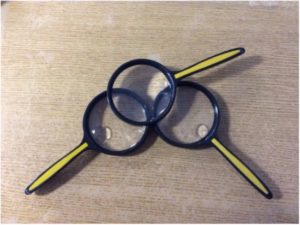Our KS3 curriculum, save a few new topics I’ve introduced, looks pretty much the same since I started here three years ago. It’s always worked well, students are engaged and since changing to an option subject, we’ve had good uptake at GCSE, but we seem to be doing the same old thing, without much thought about why we are doing it that way.
I’ve talked about the changes we’ve been making, but often these are about the content, rather than the underlying pedagogy. Now ‘knowledge rich’ and ‘retrieval practice’ do seem to be the buzzwords of the moment and it doesn’t take much scrolling through my twitter timeline before I’ve spotted it at least half a dozen times, ‘retrieval practice’ appears a little less often, but
What do we mean by ‘knowledge rich’?
Ofsted have defined it as the ‘invaluable knowledge [teachers] want their pupils to know’. Now, you might take issue with this, after all it seems to imply that we’ve just been teaching students any old thing, without proper consideration of why.
Whilst I disagree with this interpretation, I would say that it is true that we haven’t always been explicit enough with what we want students to know. The more explicit we are, the more it will help students and the more it will help us as a department in ensuring that absolutely everything that we need to cover, has been covered.
This isn’t a move towards the robotic delivery of information, it is up to each individual teacher how they deliver the information, but we can be sure that at the end of a lesson or sequence of lessons, that regardless of the teacher, the students will have been taught and should know the same things. This means that there is no risk or worry that some groups haven’t been taught certain material.
I don’t see a knowledge rich curriculum as being a million miles away from how we plan lessons and schemes of work currently. It’s just that the detail we use is far greater. It has also been a fantastic part of CPD and subject knowledge development as we really get to grips with the material that we are wanting to teach.
And retrieval practice?
Retrieval practice is all about the process of forgetting, then forcing yourself to remember. It’s how we are making sure that the information sticks and one of the processes that I believe has led to our improving GCSE results.
When I first heard about retrieval practice, it was sold to me as a sort of revision activity, but it really isn’t. It is something that is interwoven throughout the learning process, rather than something tacked on to the end of a unit of study.
The main premise of retrieval practice is that by recalling memories we are then changing that memory by making it more lasting. This has been shown in studies and has most noticeable application for the learning of facts and whilst many outsiders may have the perception that RE is one of those subjects where there is no right or wrong, us on the inside know that simply isn’t true. We do need students to know factual information.
So, it’s basically revision, right?
Wrong. I’ve many objections to what is traditionally conceived of as revision which includes, but is not limited to the following:
- It discourages learning the information properly the first time around – a sort of “don’t worry if you don’t get it now – we’ll revise it later” mentality.
- It encourages cramming – as a result it undermines a deep understanding of a topic/subject.
- It often puts the emphasis on the production of revision resources, rather than the effective use of them.
- They just don’t make the difference that we think they’re making (i.e. they make us feel better, rather than making a student’s learning more secure).
Retrieval practice by contrast discourages short-term learning and focuses instead on developing and maintaining long-term retention of knowledge as well as the ability to better apply the knowledge to new and unfamiliar topics.
So, what does it look like in the classroom?
Having a knowledge rich curriculum has been a hugely positive experience, without a huge workload. By being explicit with what needs to be learned it has meant a greater ability for teachers and students to reflect on progress that is being made.
The greater clarity around what is being taught and what needs to be learned has also meant that teachers have thought much more carefully about what needs to be learned and how it is being delivered, ultimately meaning more purposeful task setting.
For example, in the past we have studied the life of Jesus – previously our SoW would have listed something as superficial as birth, life, death and resurrection. We used to think that was more than enough detail, I mean surely that is enough detailed for a well-trained teacher of RE. Well, we found that it wasn’t, it gives no sense of priority, what if one teacher gives lots of attention to the miraculous nature of Jesus’ birth, but another teacher gives lots of attention to Jesus’ Sermon on the Mount and a third gives their priority to the story of Palm Sunday. We wouldn’t have a cohesive curriculum.
The knowledge we require is now set out far more comprehensively, if looking at Jesus’ birth my SoW would be detailed enough to say, for example:
- Gospel of Luke
- Gospel of Matthew
- Importance of prophecy
- Born in Bethlehem
- Birth of divine intervention, to fulfil the will of God to save the world from sin
It could go into much more detail to look at the flight to Egypt, the visit of the Magi, etc. I could also state that comparisons between the Gospels of Luke and Matthew are to be made and to highlight what those key differences are. The SoW that we follow doesn’t spell out which activities need to be done – the way it is taught is down to the individual teacher, but the content that needs to be covered is clear.
The only real visual different is the introduction of knowledge organisers – something that I’m sure most of us are familiar with at this stage. Whilst seemingly straight-forward, I would argue that there is much more skill and nuance to an effective knowledge organiser. It is an area that I am still learning and growing in, but I have been heavily influenced by the work of Oli Caviglioli and the Learning Scientists – the idea is that the practice of dual-coding will be built into the resources over time.
I feel like I’ve forgotten something here…
The more noticeable change is with retrieval practice – these can take many, many forms – from mind-mapping information, writing a list of key points for a topic, to low-stakes testing. The key is that they are active in the process of remembering (or retrieving) the information. One of the biggest annoyances in my life is when a student is asked to create a mind-map, they sit there with their books and notes open making it look really nice, lots of different colours with parts highlighted and huge paragraphs copied out. Then at the end, they fold it in half and put it in the back of their book to forget about until they have a test, in the belief that making the mind-map is the revision itself.
Yes, my students will have made mind-maps by reading and reducing their notes, but I impress on them the importance of not just reading over it again and again. If they’re using mind-maps, then what they have to do is read over it, then recreate from memory. Once they’ve remembered all they can, then they check against the original to see what they’ve missed. Then they repeat from memory again.
This is always supplemented by low-stakes testing, pupils start each lesson with five quick questions (5QQ) which is used to test them on older material, especially that which they have struggled with before, and to encourage them to retrieve knowledge which they will need to use and apply to the lesson they are in – for example in a lesson focusing on different Christian attitudes on divorce, I might ask a recall question on different Christian denominations, or the Reformation.
Structurally my lessons are different – but not so different – from how they were before. Retrieval forms a key part of everything that we do, but it isn’t just about retrieving any old information, I want it to be specific and focused to reinforce the learning of old material and to support new learning.
Throughout a lesson we will be learning new information – the forgetting period (in my opinion at least) has not been significant enough at this stage, so I would ask/design retrieval activities for pupils to draw upon information they have learned before which would reinforce what they are currently learning now.
We finish lesson retrieving information learned that lesson, the past few lessons and across the course – this is done in the form of low-stakes testing. We take time to discuss the answers afterwards to address misconceptions. I take particular note of which ideas students are struggling with. We either go through them in more depth or if it would be something I would require them to retrieve more frequently include them in activities like the 5QQ.
And outside the classroom?
Away from the classroom I still want pupils to perform retrieval practice – I therefore set activities to assist in this. I cannot be certain that pupils are not just copying from what they already have in their notes, therefore I supplement these activities with the low-stakes testing in lessons. Activities I would set to encourage retrieval practice are (though not limited to):
Concept mapping – sometimes they take their folders with them, other times I get them to leave their notes and folders with me. They then have to go home and concept map everything they can remember about a topic. I keep this as focused as possible, instead of everything they know about the Relationships and Families topic, I would request them to concept map divorce and I would give them guidance on the things to include, e.g. Christian attitudes. In the lesson it is due we then have the opportunity to compare to the original notes, in a different colour adding in what is missing. Then, once all is updated, it needs to be put away and the concept map is redone – all from memory.
Online quizzing – there are a variety of platforms for this. I set generous time-limits for each question to be answered in, not because I am trying to penalize those who take longer to retrieve the information, but I want to reduce the temptation to try and look up the answer in the notes. It also allows me to see which ideas or concepts pupils may be struggling with.
Look, cover, write, check – I used to have to do this for spelling practice when I was in primary. It always struck me as a useful way of forcing yourself to remember, we use this for key words and definitions as well as religious teachings.
Religious teaching matching – It’s no use students remembering religious teachings if they can’t apply them to new situations/scenarios. Students will be given a sheet with concepts listed, these could be from the same topic, or across topics. They then need to remember and correctly apply the teaching to the correct concept. The twist being that the sheet does not mention the teachings that they need to use.
How do we know that it works?
Being more knowledge-focused has definitely helped our professional discussions and student voice interviews have highlighted how pupils really like the clarity of what they are learning, especially when it comes to definitions. It has also made teacher- and self-assessment much more purposeful, as both are really clear on where a student is, and progress is much clearer to see.
Retrieval practice has had more noticeable advantages, the first exam class I tried it with performed amazingly well and several far exceeded expectations. Speaking to many of them afterwards they explained how the way we worked and the fact that we were always quizzing on the material really helped them when it came to knowing the information that they needed.
This is the beginning of a journey and needs to become more fully embedded in our practice as a department, but I believe that it sets solid foundations for which to build high-quality Religious Education on top of.

 I have bought several magnifying glasses to add to the explanation. This has helped students to understand that we all have different personal worldviews as I hold them up when explaining each individual view. It also helps to illustrate other worldviews. I have also shown how these lenses can ‘cross over’ which illustrates how views can be ‘combined’. An example was when we were discussing ‘how did the world get here?’ Students came up with answers ‘God made it’ and ‘the Big Bang’. I held up a lens for each of these views and then crossed them over. For some students this was a new Christian worldview; that God created the Big Bang.
I have bought several magnifying glasses to add to the explanation. This has helped students to understand that we all have different personal worldviews as I hold them up when explaining each individual view. It also helps to illustrate other worldviews. I have also shown how these lenses can ‘cross over’ which illustrates how views can be ‘combined’. An example was when we were discussing ‘how did the world get here?’ Students came up with answers ‘God made it’ and ‘the Big Bang’. I held up a lens for each of these views and then crossed them over. For some students this was a new Christian worldview; that God created the Big Bang.